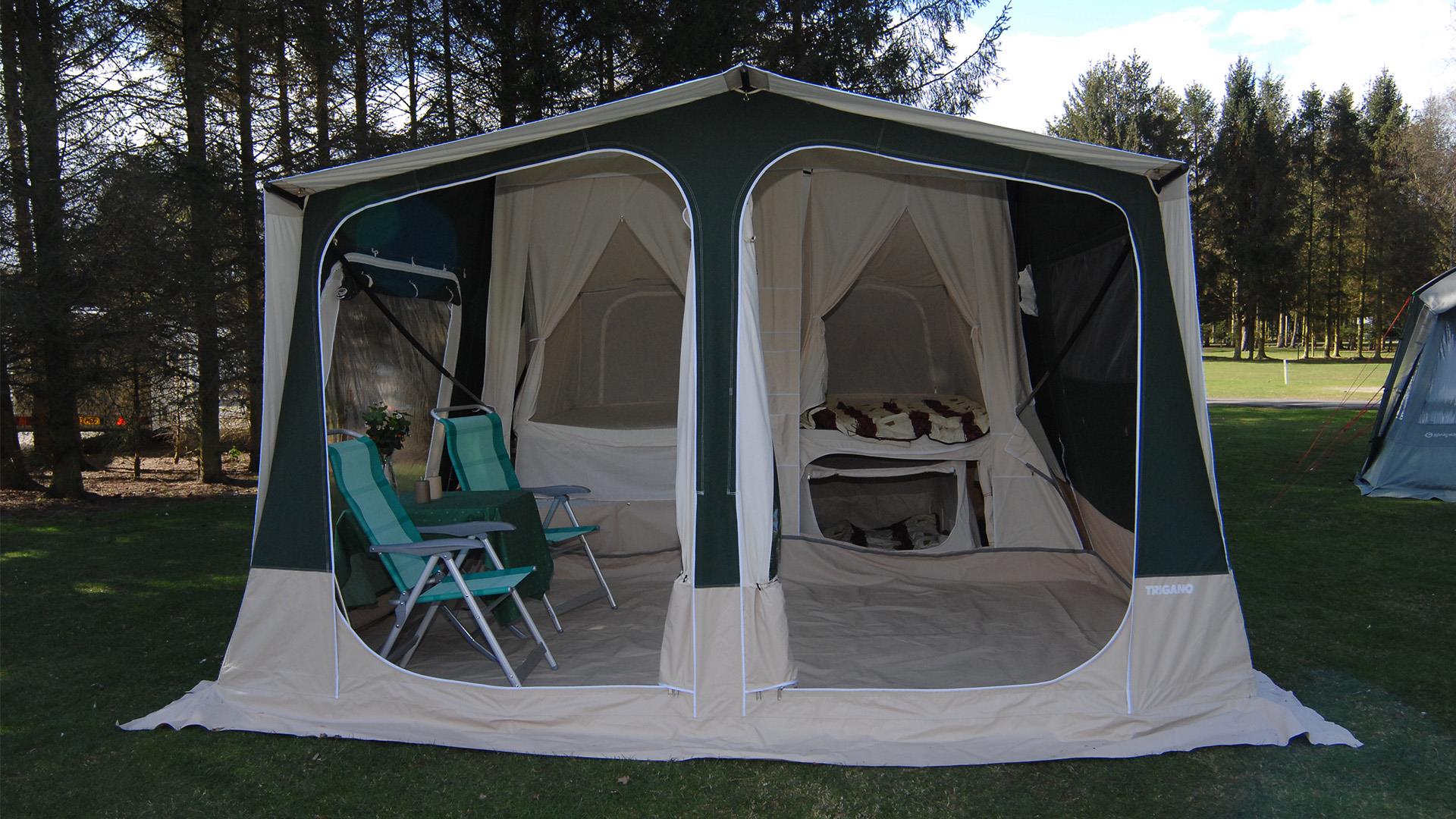Expert Guide to Buying a Trailer Tent or Folding Camper
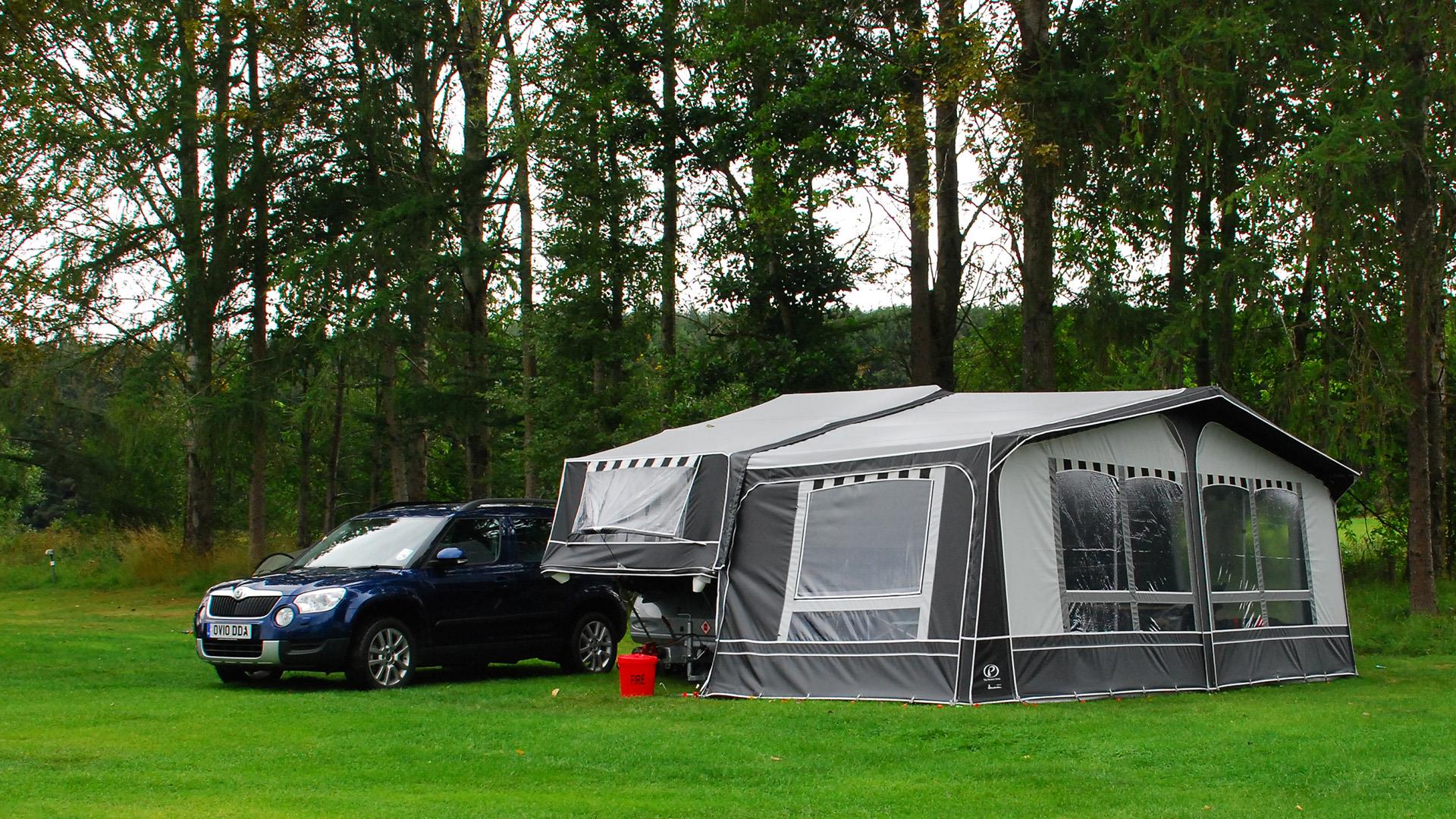
Trailer tents and folding campers are a small part of the camping and caravanning world, but an important one.
Speak to any relevant Club member about his or her trailer tent or folding camper and you’ll soon be regaled with stories of why these represent the best of both tent camping and caravanning.
Easy and economical to tow, stow and own, yet offering enough facilities for full self-sufficiency if that’s what you want, they seem to represent the ideal compromise between the joys of ‘canvas’ and the relative comforts of a ‘tin tent’.
In fact, this style of camping unit can look expensive compared with a normal tent, but often good value in comparison to a caravan or motorhome. As ever, the choice is yours.
However, before you move to full ownership of a trailer tent or folding camper, there are a number of factors to consider as well as general buying information. Will your car tow it?
Where will you keep it? What are the key safety and maintenance concerns?
This guide is aimed primarily at those who are new to this type of camping unit, whether you’re thinking of buying new or secondhand.
Spot the difference...
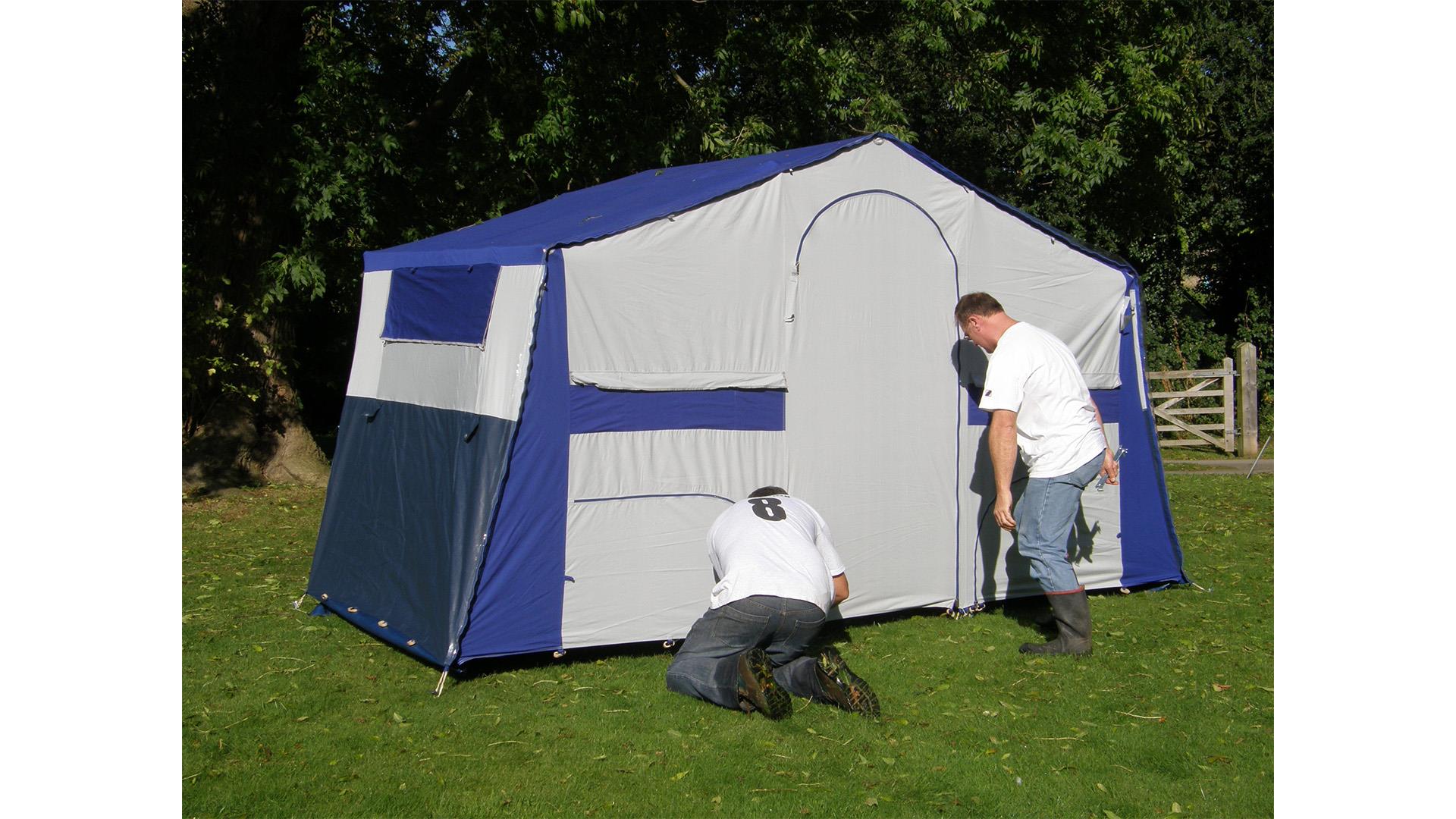 A trailer tent with side skirts and underbed tent compartments
A trailer tent with side skirts and underbed tent compartments
There’s a key difference between folding campers and trailer tents, which isn’t always noticeable when the units are pitched on site. The trailer tent is best described as a tent in a trailer that pulls out and pegs to the ground, still using the trailer part for a bedroom area. Once pitched, often the only thing to distinguish it from a typical frame tent would be the trailer hitch.
A folding camper is where there is no canvas (except the awning, if used) pegged directly to the ground. Usually, bedroom areas will fold (or sometimes slide) out from the trailer unit, remaining off the ground once erected. There are others that are a half way house as pictured to the left below.
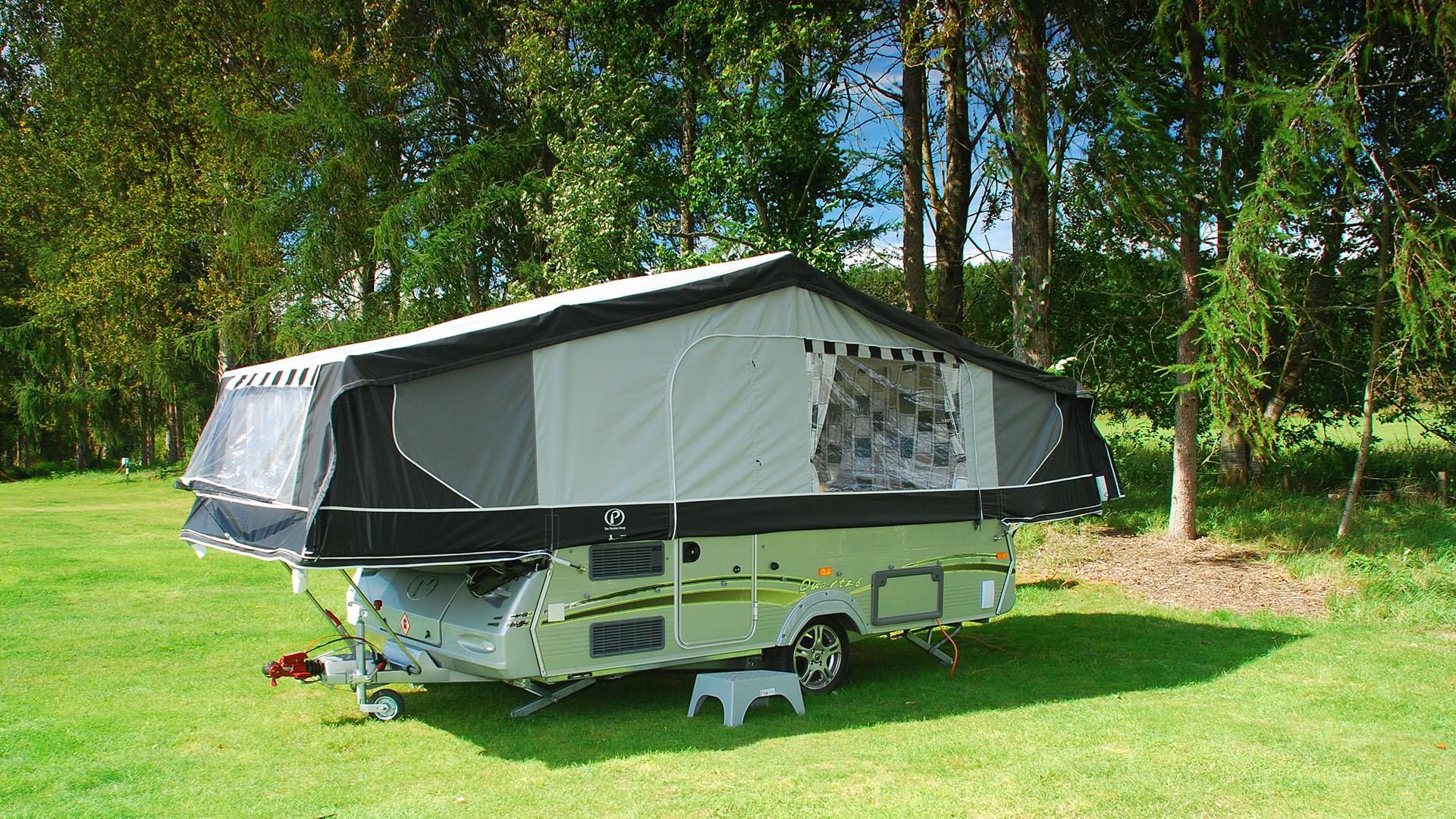 The main body of a folding camper needs no pegging
The main body of a folding camper needs no pegging
Note: Pennine for a short period produced a range of well-equipped folding campers called convertible caravans. These shouldn't be confused with a folding caravan as the latter has rigid sides, the Pennine product has fabric for the sides and roof.
Why choose a trailer tent or folding camper?
There are many advantages and a few disadvantages to trailer tents and folding campers compared with other forms of camping.
These include:
- They are generally easier and more economical to tow than a caravan
- They are acceptable on many campsites where caravans are not permitted
- They can be easier to pitch than an equivalent-size tent, although a level surface always makes things easier
- Ready-made beds with traditional mattresses that are ‘off the ground’
- Living space in folding campers that is off the floor
- An extensive living area if an awning is fitted The need to ensure your car can tow the trailer, including having a towbar and electrics
- On-board storage so you can keep most of your camping gear with the unit at all times, ready to hitch up and go
- Being easy to store
- Speed limitations, as applicable to all trailers. For example, you can’t go over 60mph or use the outside overtaking lane on motorways with three or more lanes. On single carriageway roads you’re restricted to 50mph unless a lower limit is in place. However, there is no additional road tax to pay for taking a trailer on the road in the UK and in most cases you won’t need to supplement your driving licence to tow a trailer tent or folding camper
- You’ll pay extra for taking a trailer on most ferry crossings, although the Club negotiates favourable terms for its members with all leading ferry operators
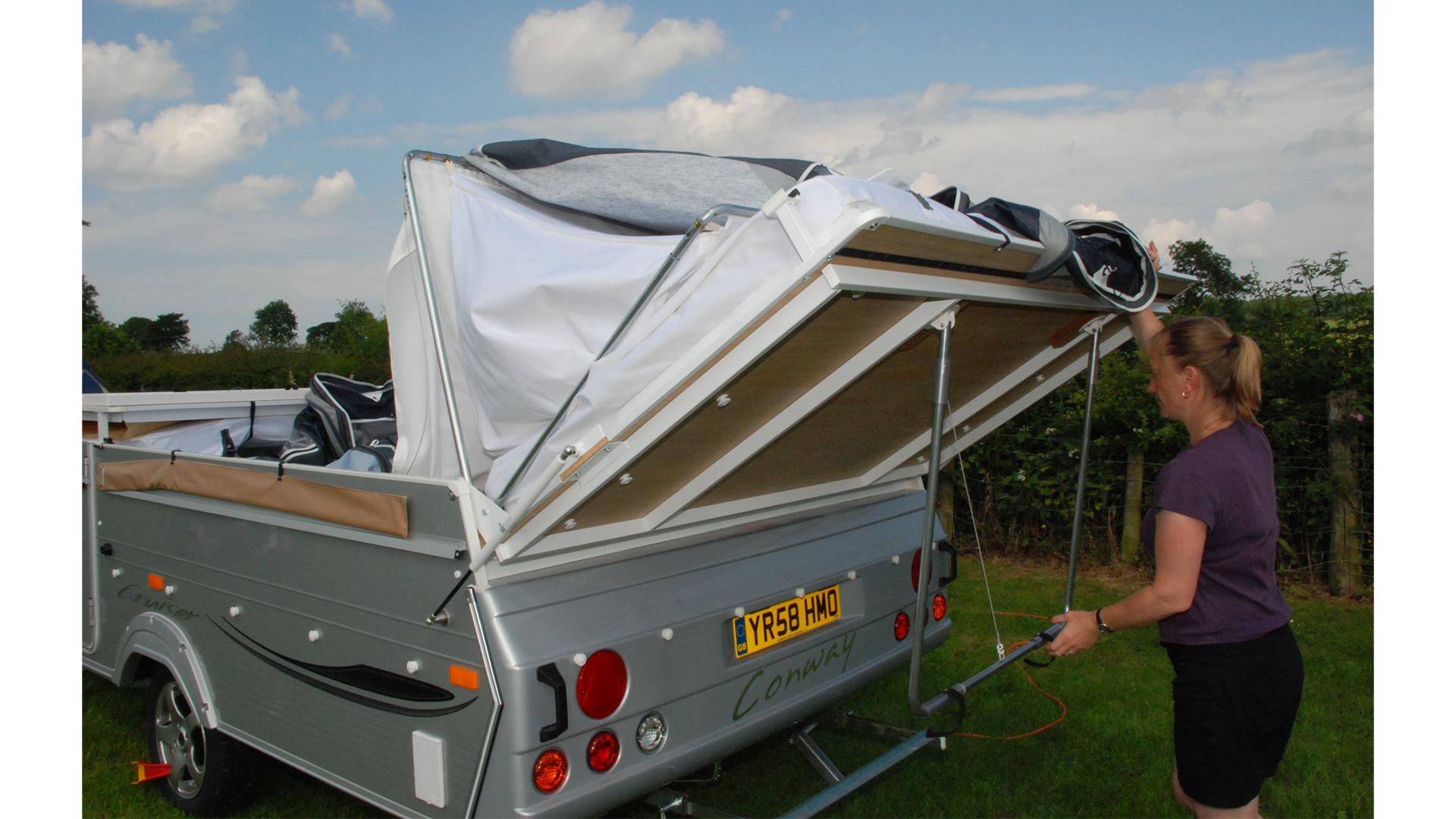 If you have to put your folding unit away wet, pitch it as soon as possible when home to dry it out
If you have to put your folding unit away wet, pitch it as soon as possible when home to dry it out
- Packing canvas away when wet is not only tricky, but can lead to problems such as mould and mildew. If you find you have no choice but to pack your camper away under such conditions, the advice is to unpack as soon as possible and allow the material to dry completely before putting it away again.
- For many, a key reason for buying a unit like this is the ability to store it at home – either outside or even in the garage. Many trailer tent units can also be adapted to stand on their sides or ends, meaning they take up even less space.
- If you don’t have room at home, any specialist retailer will be able to tell you of storage compounds available locally (although you might also wish to consider storing near your chosen camping locations to save further on ‘towing miles’). Many Club Sites offer storage, or there are the services offered by the specialist organisation CaSSOA (Caravan Storage Site Owners Association, www.cassoa.co.uk).
- Another bonus of trailer tent or folding camper ownership is that theft is rare. However, it has been known to happen, therefore do consider extra security in terms of a hitchlock, wheelclamp or both. Also, consider carefully any items of value (sentimental or otherwise) you choose to keep in your unit.
Where can I buy?
One of the best places to start looking for a trailer tent or folding camper is using the assets the Club provides to its members for free. This may be the Club magazine or in the review pages on the Club YouTube channel. There is also a good network of specialist retailers around the country, you may see adverts in the Club’s magazine and in the private classifieds section too.
When buying previously-owned units privately, remember you won’t get any kind of warranty if anything goes wrong or if anything is subsequently deemed illegal – so be sure you know exactly what you’re getting for your money.
Look out also for displays of new trailer tents and folding campers at the larger specialist camping and caravanning shows taking place throughout the year.
What can I tow?
A critical consideration before going ahead with the purchase of a trailer tent or folding camper is to ensure your car is capable of towing it. In most cases, this shouldn’t be a major issue. Some of these units use unbraked trailers that can legally only have a maximum gross weight (Maximum Authorised Mass – MAM) of up to 750kg, while trailers with MAM over 750kg must have brakes.
For comfortable towing, we recommend you should tow with the loaded trailer weight no more than 85 per cent of your car’s kerbweight and of course keep within your car’s maximum towing limits for braked and unbraked trailers, as appropriate.
You also need to ensure your car’s noseweight limit is adequate for the trailer, although this is only likely to be a problem with larger units. For more information, see our Expert Guide on Matching Car and Caravan.
Remember, trailer tents and folding campers are subject to the same laws as any kind of trailer or caravan, including the legal requirement to use extension mirrors if necessary, see our diagram and image below. If in doubt about your car’s towing capabilities, always check with the Club’s Technical Department.
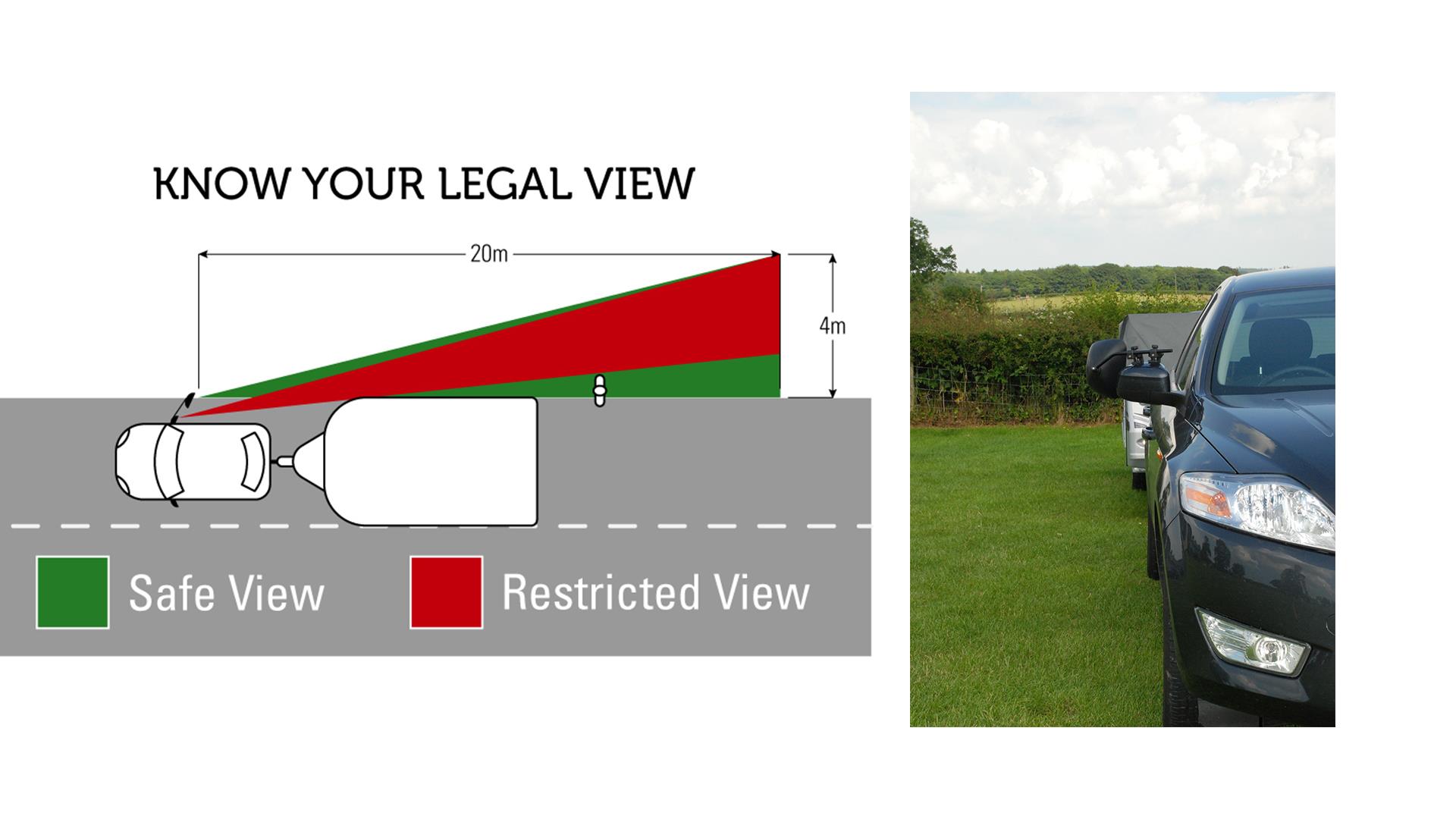
You’ll also need to check the limits of your driving licence before you take to the road with a trailer tent or folding camper in tow.
Click here for detailed information about the limitations of a licence.Buy new
There isn’t a massive market for new trailer tents or folding campers, but there’s still a decent choice of make and model, so it pays to do your homework to decide exactly what’s best for you.
- Find out what you can get for your money in terms of unit size, layout and features. As far as the latter is concerned, make a list of the items you want – awning, kitchen, food storage facilities, general storage, toilet – then sub-divide them into ‘essentials’ or ‘desirables’
- Visit more than one retailer. General advice may vary and they’re likely to have different makes and models in stock, at different prices too. Rather than just price, try to assess how helpful a dealer is going to be once a sale has been made
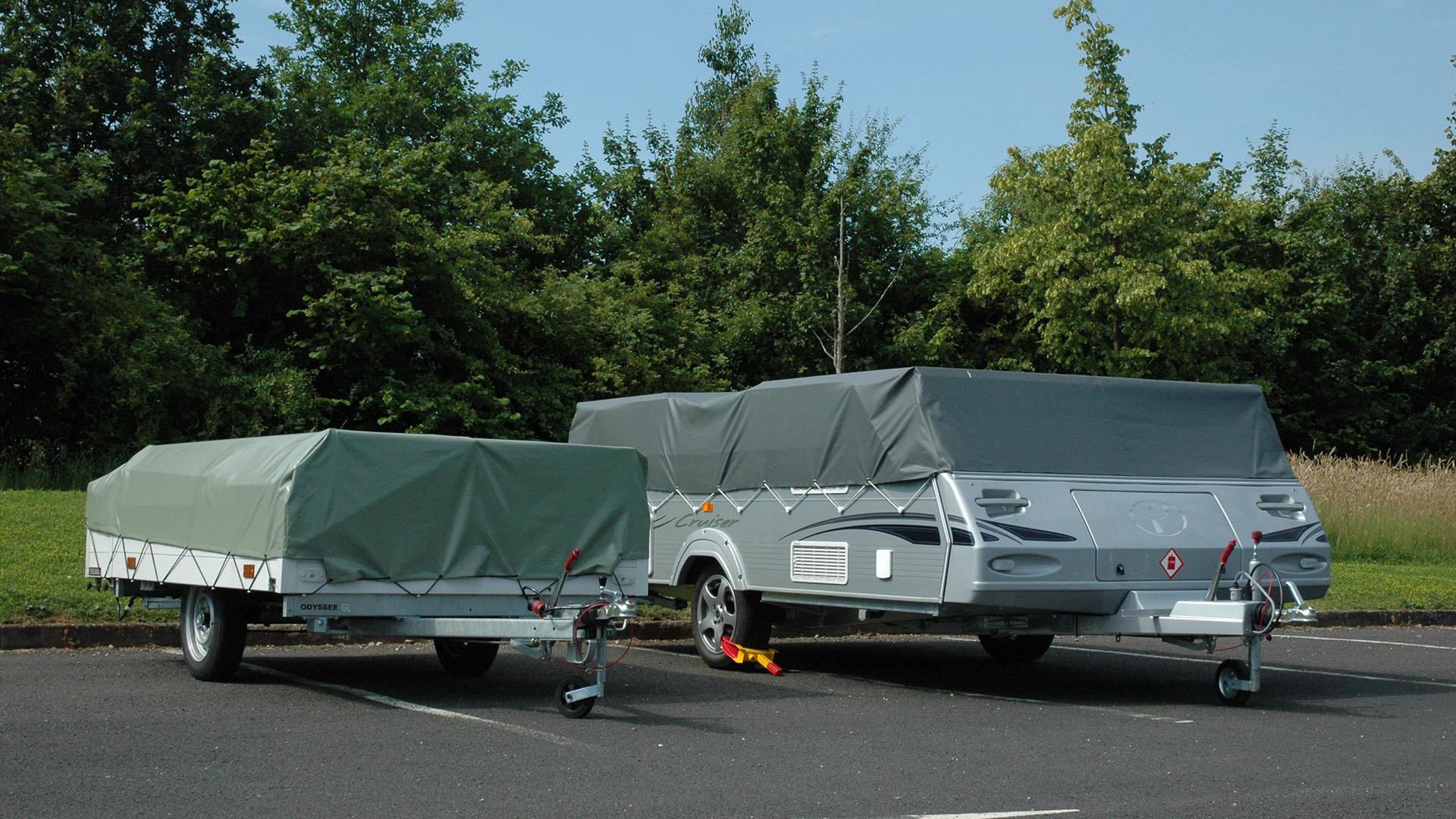
- Ask for a demonstration of how to pitch and take down the unit. Trailer tents sometimes have excellent kitchen units but they can be heavy to manoeuvre into place. Similarly, while folding campers are usually easier and quicker to pitch than trailer tents, sometimes internal furniture units can be heavy to erect
- Check exactly what you get for your money. Look at the optional extras list to see if there’s anything you deem essential. Usually a spare wheel and carrier are optional but consider these essential. Similarly an optional jockey wheel could be essential for ease of manoeuvring as would be a leisure battery if the unit is fitted with 12V lighting and appliances
- If you’re new to camping, you’ll need to budget for other items such as a gas cylinder, security fittings (such as a hitchlock and/ or wheelclamp), water carriers etc. Again, a good retailer will be helpful here, and may even have special offers in place for such scenarios
- Bear in mind general availability as well as lead times for the building of brand new units. Typically, the more options you want (especially factory-fitted ones) the longer you will have to wait
- Check compatibility with your car. Any specialist retailer will be able to advise here (see earlier sections).
- Other aspects to note vary from canvas thickness and type (generally the thicker the better and water-repellent acrylic fabrics are starting to become available) to ventilation, window size and how the unit is likely to perform in extreme weather
Buying secondhand
Much of the advice on buying new also applies to buying secondhand. But here you’ll also need to assess further aspects of any unit for yourself. Always view during daylight hours and, if buying privately, at the current owner’s home address. In particular, for the trailer unit itself, these are the points to focus on:
- Tyre condition. Many trailers have long periods of inactivity and though the tyres may look serviceable they’ll have aged. It may seem counter-intuitive but an idle tyre ages much faster than one frequently use. Inspect them and check the pressure prior to every trip. See our Expert Guide to tyres.
- Hitching gear and brakes (where fitted) should be fully operational
- Lighting should be functioning and in good condition, whatever the age of unit. Check on the availability of replacement parts such as lights for older models.
- Look for signs of damage to the bodywork, especially on any leading edges, and that all frame poles and their attachments are sound
- Any hinges and locks, including corner steadies, should operate smoothly and be suitably lubricated
- Don’t be afraid to crawl underneath to look at the condition of the chassis. Most structures are galvanised, but rust might develop over time. Also check for signs of rotting to the flooring.
Also, on the camping side:
- Check on the operation of all services, especially electrics (12V and/or 230V)
- Gas cookers should burn with an even, blue flame.
- Canvas condition is a critical area. As well as any possible areas of wear (usually caused by rubbing at corners and stress points), look out for mildew caused by the unit being folded away when wet
- Make sure all appropriate cushions and mattresses are supplied. Again, check for signs of damp here as well as on the seats and bed bases themselves
- Kitchens. Some trailer tents and most folding campers come with a kitchen as standard. With others it’s a (sometimes pricey) option. As well as determining for yourself whether you need one (or would rather supply your own gear), check out its location and accessibility.
- Ask for any details of repair and/or regular servicing work. This will give important clues as to the fastidiousness of previous owners and the likely roadworthiness and safe condition of gas and electrical systems
- Ask about any warranty, exactly what it covers and for how long
- Always get a receipt from the seller when you buy or pay a deposit.
Top tips
- Whether buying new or secondhand, make sure you get a full demonstration of all aspects of the unit. As well as being shown how to pitch it, have a go yourself so that you are confident of the processes involved.
- Make sure you are happy with the hitching and unhitching processes. Again, practise soon makes perfect, but before you set off on any journey always check the roadlights are fully functioning. It’s also a good idea to get into the habit of making a final all-round inspection just before setting off to ensure everything is secure, properly connected and working.
- Although it shouldn’t affect your current policy you must inform your car insurance company if you have a towbar fitted and that you will be towing. The same goes for any breakdown recovery service you use.
- Finally, before you set off with your new trailer tent or folding camper it will need an approved, illuminated number plate, to match your car’s registration.
Putting up a trailer tent
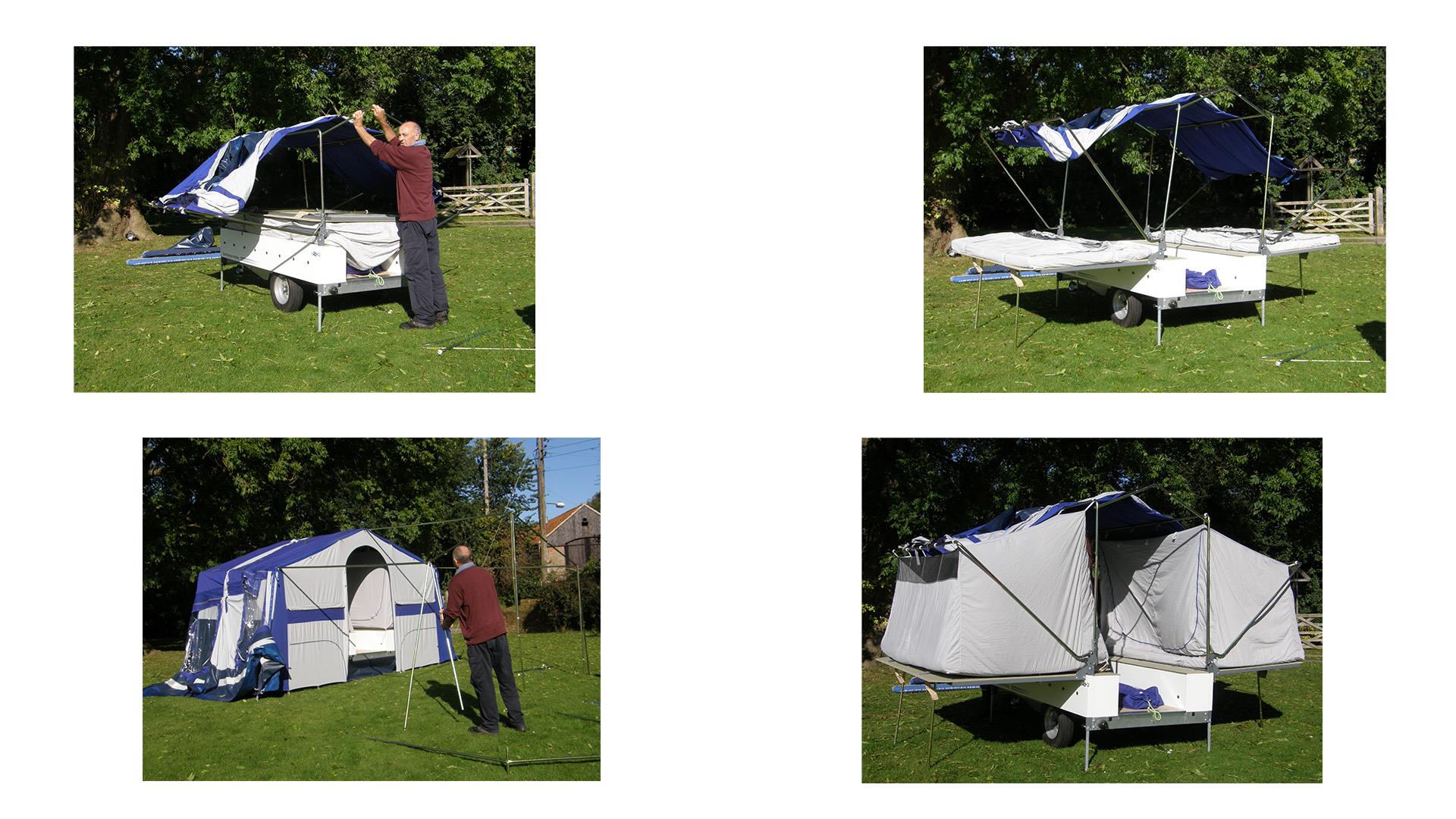
It’s always worth trying to pitch the unit before you commit to buying. In this traditional trailer tent the two beds fold out from the trailer and the unit can be used in this form. The awning extends the living area and has a separate section for storage, a kitchen area or washroom.
Maintenance
Luckily, such is the established design of most trailer tents and folding campers, there’s not a lot to go wrong. However, since they are road vehicles you are responsible for keeping them roadworthy, so a minimum of an annual service by a recognised service technician is recommended. The larger units with more sophisticated electrical and gas systems will also benefit from an annual service of these systems, again by a recognised service technician. You’ll find more details in owners’ manuals (and sometimes on manufacturers’ websites), but generally you need to consider:
- Brakes, wheel bearings and suspension – keep in good working order and properly adjust or grease as appropriate
- Tyres – keep inflated to correct working pressures, including the spare, and check for any uneven signs of wear. If the unit is stationary for long periods, turn the wheels occasionally so it doesn’t rest on the same patch of tyre
- Tow hitch – check for easy operation and grease where needed
- Breakaway cable (braked trailers) or secondary coupling (unbraked) – check in good working order
- Jockey wheel – check for smooth running. Apply grease as needed
- Lights – check and replace as needed.
- Rubber gas hoses – check condition and the date marked on it. The recommendation is to replace within five years of any such date, or earlier if there are any signs of abrasion or cracking.
Further information
You won’t find any newsstand publications devoted solely to trailer tents and folding campers but the Club magazine, Camping magazine, Motorhome & Caravan Trader and Caravan, Motorhome and Camping Mart can be useful sources of information.
The Camping Manual, by Peter Frost, devotes a whole chapter to trailer tents and folding campers. It’s published by Haynes, ISBN 9781844253197.
Finally, do look for advice from the Club’s own Special Interest Section, the Trailer Tent and Folding Camper Group (see also www.ttfcg.co.uk).
There are also a number of owners’ clubs for both existing makes and those that are now no longer in production, for example Dandy (www.dandyowners.co.uk).

